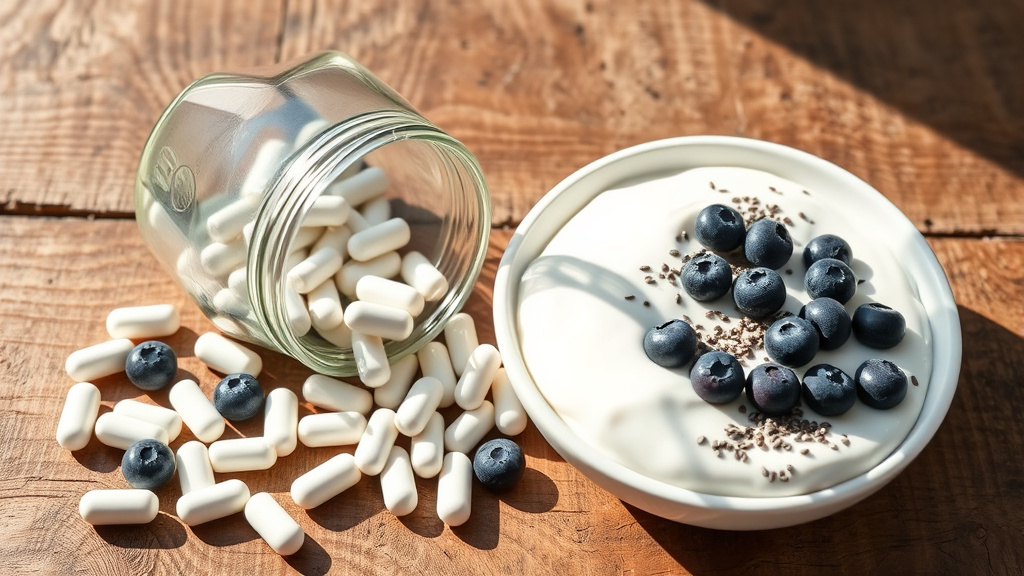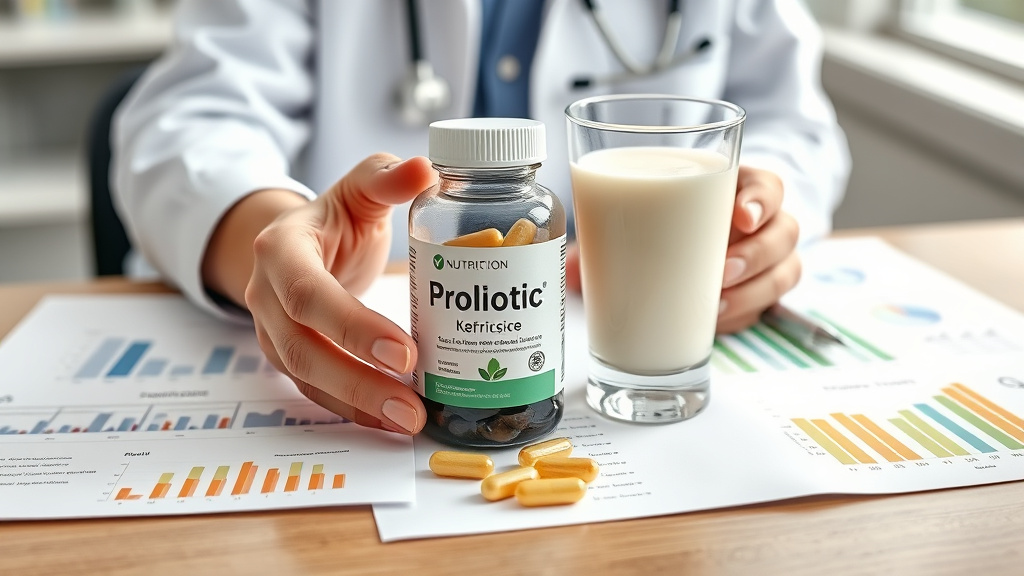Boost Digestive Health: Probiotics for Gut Health and Immunity (2025 Guide)
In recent years, probiotics for gut health and immunity have surged in popularity, not just as trendy health supplements but as scientifically supported solutions for maintaining overall wellness. These beneficial bacteria, which naturally inhabit our digestive system, play a crucial role in supporting digestive wellness, enhancing the immune response, and sustaining a balanced microbiome diversity. As research deepens, understanding how to harness the power of probiotics can lead to more effective strategies for preventing digestive issues and boosting immunity. This comprehensive guide aims to demystify probiotics, providing insights into their functions, benefits, selection tips, and practical applications, so you can make informed choices for a healthier life.
The intersection of gut microbiota and immune health is particularly fascinating. Our gut harbors trillions of microorganisms that influence not just digestion but also immune regulation and even mental health. Incorporating the best probiotic supplements and understanding the roles of various bacterial strains can help optimize your microbiome balance, leading to improved digestive health support and a more resilient immune system. Whether through dietary sources like fermented foods, or targeted supplements, developing a personalized approach to probiotics can significantly impact long-term health and productivity.

Probiotics support digestive balance and strengthen immunity.
Why Probiotics Matter for Gut Health and Immunity
The Gut Microbiome Explained
The human gut microbiome refers to the vast community of microorganisms living within our digestive tract. These include bacteria, viruses, fungi, and other microbes—though bacteria are the most studied. This complex ecosystem performs essential functions such as fermenting indigestible fibers, synthesizing vitamins, and supporting the health of the intestinal lining. Importantly, the concept of microbiome diversity emphasizes the importance of maintaining a varied community of beneficial bacteria, which helps prevent overgrowth of harmful microbes and sustains overall digestive wellness.
Disruptions to this microbiome balance—due to diet, antibiotics, stress, or illness—can compromise digestive function and weaken immune defenses. By introducing probiotics for gut health and immunity, we can replenish beneficial bacteria, restore microbiota diversity, and stabilize gut microbiota. This not only helps to optimize digestion but also enables the immune system to mount more effective responses against pathogens, illustrating the interconnected nature of gut health and immune resilience.
Probiotics and Digestive Function
Probiotics are live microorganisms that, when consumed in adequate amounts, confer health benefits to the host. Their role in supporting digestive health is well-documented, with benefits such as alleviating symptoms of irritable bowel syndrome, reducing diarrhea, and improving nutrient absorption. They produce digestive enzymes that enhance the breakdown of food and facilitate better nutrient assimilation. By colonizing the gut with beneficial bacteria—such as Lactobacillus and Bifidobacterium strains—probiotics help maintain a healthy gut environment and prevent the proliferation of pathogenic microbes.
In everyday life, incorporating probiotics into your diet can be as simple as enjoying fermented foods like kefir, yogurt, sauerkraut, or kimchi. These foods naturally contain probiotics and are a delicious way to support your digestive health. Alternatively, choosing multi-strain probiotic supplements ensures a broader spectrum of bacteria, which can be more effective for supporting microbiome diversity and digestive wellness over time. The key is consistency and selecting strains proven to support your specific health needs.
Probiotics and Immune Defense
A significant aspect of probiotics’ benefits lies in their influence on immune response. About 70% of the immune system resides in the gut, making it a critical battlefield for immune activation and regulation. Probiotics can modulate immune cells, such as macrophages, T lymphocytes, and natural killer cells, fostering a more robust defense against infections. Additionally, beneficial bacteria produce metabolic byproducts like short-chain fatty acids, which have anti-inflammatory effects and support the integrity of the gut barrier.
Clinical studies have indicated that consistent probiotic intake can reduce the severity and duration of respiratory infections, flu-like symptoms, and even autoimmune conditions. The interplay between prebiotics and probiotics amplifies these effects, as prebiotics serve as fuel for the beneficial bacteria, encouraging their growth and activity. This synergy enhances immune response, positioning probiotics not just as digestive aids but as vital allies in building immunity. Recognizing their role can inspire more proactive health management, especially during seasons prone to illnesses or in individuals with immune-compromising conditions.
Best Probiotics for Gut Health and Immunity
Lactobacillus Strains

Lactobacillus is perhaps the most renowned probiotic genus, with numerous strains tailored for different health benefits. These bacteria are commonly found in yogurts and fermented foods, known for their ability to adhere to the intestinal lining and inhibit the growth of harmful pathogens. Strains like Lactobacillus rhamnosus and Lactobacillus acidophilus are particularly effective in supporting digestive health, reducing bloating, and promoting a healthy gut barrier.
One interesting insight from clinical studies is that certain Lactobacillus strains can increase the production of digestive enzymes, which aid in nutrient assimilation and improve overall digestive wellness. These bacteria also stimulate the production of mucus, reinforcing the gut’s protective barrier, which is crucial during illness or after antibiotic use. When selecting the best probiotic supplements, paying attention to the specific Lactobacillus strains included can help tailor your health journey according to your needs.
Bifidobacterium Strains
Bifidobacteria are another essential genus of beneficial bacteria predominantly residing in the colon. Known for their role in early-life gut colonization and maintaining gut microbiota stability in adults, Bifidobacterium strains help in fermenting dietary fibers, producing short-chain fatty acids, and reducing inflammation. These bacteria are particularly effective in managing conditions like irritable bowel syndrome, diarrhea, and constipation.
Studies consistently show that Bifidobacterium strains can enhance digestive health support by maintaining the integrity of the mucosal lining and preventing pathogen invasion. For immune support, Bifidobacteria help modulate cytokine production, thereby fine-tuning immune responses without excessive inflammation. Multiplex probiotic formulas often combine Lactobacillus and Bifidobacterium strains to maximize benefits, reinforcing the idea that a diverse microbiome is vital for both gut health and immune resilience.
Multi-Strain Probiotic Supplements
Given the complexity of the gut microbiome, multi-strain probiotic supplements are increasingly popular. These formulations combine various beneficial bacteria, often including Lactobacillus, Bifidobacterium, and other genera, to simulate a well-rounded microbiota. Their advantage lies in providing broader digestive health support and immune modulation, addressing multiple pathways simultaneously.
Recent research highlights that multi-strain probiotics can improve microbiome diversity and increase the resilience of gut microbiota, thereby reducing the likelihood of dysbiosis. They are especially useful after antibiotic treatments or in individuals with chronic digestive issues. When selecting such supplements, it’s important to consider strain compatibility, CFU count, and quality control measures to ensure potency and safety.
How to Choose the Right Probiotic Supplement
CFU Count and Strain Diversity
Choosing an effective probiotic begins with understanding the importance of CFU counts—colony-forming units—which indicate the number of live microbes in a supplement. While higher CFU counts can be beneficial, more isn’t always better; targeted strains and their viability matter more. A typical effective dose ranges from 1 billion to 10 billion CFUs per serving, depending on your specific health goals.
Equally important is strain diversity—a variety of well-researched strains can enhance benefits, support microbiome diversity, and improve resilience. Look for products that specify strains with documented benefits in clinical studies, such as Lactobacillus rhamnosus GG or Bifidobacterium lactis.
Delivery Methods (Capsules, Powders, Fermented Foods)

Look for diverse strains, quality testing, and proper storage.
Probiotics come in many forms, each with its pros and cons. Capsules and tablets are convenient, providing precise dosing and better protection of bacteria through stomach acid. Powders or sachets allow for versatile intake, adding probiotics to smoothies or water. Fermented foods like kefir, sauerkraut, and kimchi are natural sources rich in beneficial bacteria but may vary in CFU content.
Choosing a delivery method depends on personal preference, taste, and lifestyle. For maximum efficacy, consider products designed with acid-resistant coatings or those stored with proper conditions to maintain bacterial viability.
Storage and Quality Control
Probiotic stability varies depending on storage conditions. Many require refrigeration to preserve CFU viability, while some formulations are shelf-stable. Always check expiry dates, storage instructions, and manufacturing practices. Reliable brands often perform third-party testing for purity and potency. Proper storage and quality control are crucial for ensuring that your probiotic supplement delivers the intended benefits effectively.
FAQs about Probiotics for Gut Health and Immunity
Can probiotics cure digestive problems?
Probiotics are not a cure-all but can significantly improve digestive health when used appropriately. They help alleviate symptoms like bloating, diarrhea, and irritable bowel syndrome by restoring microbiota balance. However, persistent or severe digestive issues should always be evaluated by a healthcare professional.
How long should I take probiotics to see results?
The timeline varies among individuals but generally, noticeable benefits in digestive comfort and immunity begin to appear after a few weeks of consistent use. Continued maintenance may be necessary for sustained effects, especially during periods of stress or illness.
Are probiotics safe for everyone?
For most healthy individuals, probiotics are safe with minimal side effects, primarily mild gas or bloating initially. However, those with weakened immune systems, pregnant women, or individuals with serious illnesses should consult healthcare providers before starting probiotics.
Conclusion
In nurturing probiotics for gut health and immunity, we embrace a natural and scientifically supported approach to wellness that recognizes the complex interplay between our microbiota and overall health. Supporting the microbiome with the right strains—whether through diet or supplements—can enhance digestive function, bolster immune defenses, and promote long-term resilience. As research continues to reveal the profound impact of beneficial bacteria, it becomes clear that taking proactive steps to improve microbiome diversity and balance is a powerful investment in both physical health and mental well-being. With thoughtful selection of the best probiotic supplements, adherence to proper storage, and integration with a balanced diet, anyone can optimize their gut health and immune response for a healthier, more vibrant life.
Discover more supplement insights in our Supplements Hub.
